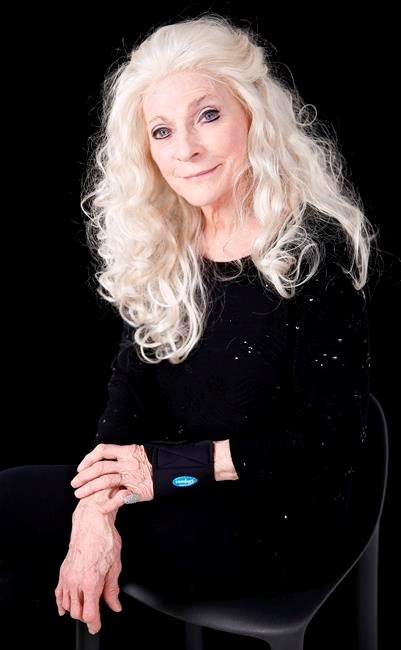NEW YORK — When she was 24, folk singer Judy Collins went onstage in New York City to record her first live concert and maybe inspire social change. Last month, she returned to the same stage to do the whole thing again.
Collins recreated her legendary concert hall debut at The Town Hall from March 21, 1964, recorded on the cusp of Freedom Summer. The encore edition came just months after another turbulent summer, with protests against police brutality.
“We’ve come a long way, but we haven’t come very far,” the now 81-year-old tells The Associated Press. “We always have to be awake. We can’t go to sleep."
There was no audience when Collins returned to the 1,500-seat The Town Hall because of COVD-19 fears, but a stream of the new concert will be available Feb. 12 as well as a vinyl album.
Collins was a rising star in the world of folk music when she recorded the concert, which would become the album “The Judy Collins Concert.” She was not yet writing her own songs and instead interpreting tunes from the likes of Bob Dylan and Billy Edd Wheeler with her shimmering soprano.
Collins performed three Wheeler songs — “Winter Sky,” “Red-Winged Blackbird” and “Coal Tattoo” — and three from Tom Paxton — “The Last Thing on My Mind,” “My Ramblin’ Boy” and “Bottle of Wine” — as well as Dylan’s haunting “The Lonesome Death of Hattie Carroll.”
“I have always tried from the very beginning to record songs that I felt were going to be timeless,” she says. “These hold up.”
There were songs about coal miners, reproductive rights, yearning for freedom, racial injustice and a lullaby for Medgar Evers’ son. Later that summer in 1964, Collins would travel through Mississippi trying to register people to vote.
“Life is always full of conflict, forever and ever,” she says. “It’s also full of opportunity and beauty and blessings of art. And that’s why we have to get reminded of that throughout history.”
Collins wasn't daunted by a lack of audience on her recent return to The Town Hall. “Oh, no, I can do it any way — standing on my head, sitting in the bathtub, sitting up from a deep sleep. The singing and the performing are so natural to me,” she says. “I love it.”
When asked if she changed the arrangements after 57 years, she laughed: “I sang them like Judy Collins. People may complain, but that’s their business.”
Someone who was in the audience during the Jan. 19 taping — and someone very happy to be there — was Melay Araya, artistic director of The Town Hall.
“The way that she fills up that space is really unlike many artists,” she says. “I hope people at home can feel that. I hope people at home can feel that level of intimacy because it was really unbelievable. I have goosebumps.”
Collins peppers the new concert with personal stories interweaved with ones about The Town Hall, which is celebrating its centennial this year. One of the songs — “Me and My Uncle” — has a fascinating history.
John Phillips, then the leader of The Journeymen and later of the Mamas & the Papas, wrote the song and played it one night when both he and Collins were high on acid.
“I was stoned to the eyeballs, but I remembered all of that song and I went home and worked on it and practiced it and put it on the record,” she recalls. “And he said, ‘I don’t remember writing that song.’”
After that first recorded concert, Collins would go on to write her own songs and win a Grammy. Her signature songs include “Both Sides Now” from her hit album “Wildflowers” and her take on “Send in the Clowns.” She inspired a folk-rock classic, the 1969 Crosby, Stills and Nash hit “Suite: Judy Blue Eyes.”
At The Town Hall encore show, Collins added to the setlist “Both Sides Now,” “Anathea,” ”Amazing Grace" and Jimmy Webb's song “Highwayman.” She picks them like she picks all of them — by connection.
“I don’t take a song apart and say this and that and the other thing or try to analyze it. It’s how it affects me emotionally at the beginning, middle and end,” she says.
She's finishing a new album, to be released in spring 2021 called “Beauty and Resistance,” which will include “Dreamers,” a song inspired by immigrants that's “maybe the best thing I ever wrote.”
“We need beautiful songs. We need beautiful poems. We need beauty to look at and feel, whether it’s in nature or painting or art of any kind," she says. "So we have to be prepared to embrace the beautiful, but also embrace resistance to the terrible.”
___
Mark Kennedy is at http://twitter.com/KennedyTwits
Mark Kennedy, The Associated Press




